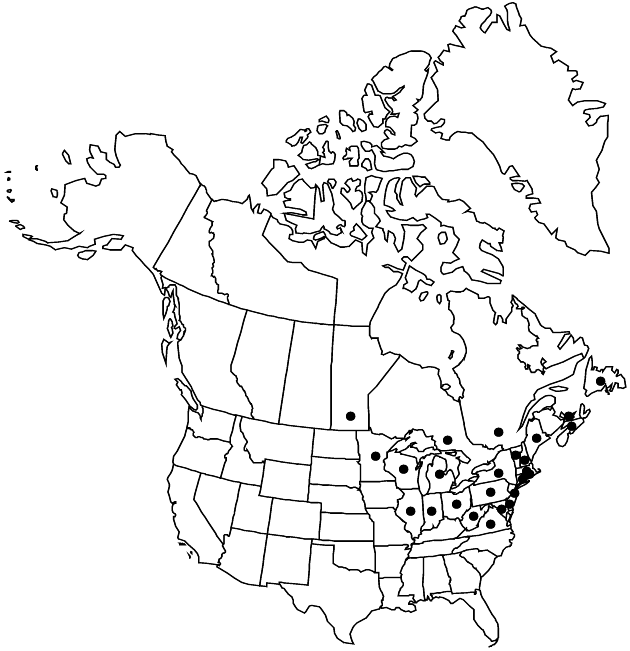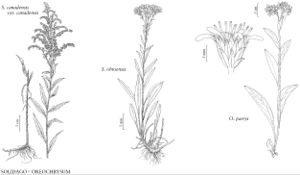familyAsteraceae
genusSolidago
sectionSolidago sect. Solidago
subsectionSolidago subsect. Triplinerviae
speciesSolidago canadensis
Difference between revisions of "Solidago canadensis var. canadensis"
FNA>Volume Importer |
FNA>Volume Importer |
||
| Line 19: | Line 19: | ||
|elevation=0–1000+ m | |elevation=0–1000+ m | ||
|distribution=Man. ;Nfld. and Labr. (Nfld.) ;N.S.;Ont.;P.E.I.;Que.;Conn.;Del.;Ill.;Ind.;Maine;Md.;Mass.;Mich.;Minn.;N.H.;N.J.;N.Y.;Ohio;Pa.;R.I.;Vt.;Va.;W.Va.;Wis.;introduced in Europe. | |distribution=Man. ;Nfld. and Labr. (Nfld.) ;N.S.;Ont.;P.E.I.;Que.;Conn.;Del.;Ill.;Ind.;Maine;Md.;Mass.;Mich.;Minn.;N.H.;N.J.;N.Y.;Ohio;Pa.;R.I.;Vt.;Va.;W.Va.;Wis.;introduced in Europe. | ||
| − | |discussion=<p>Variety canadensis is cultivated and introduced in western states and in Europe. Typical var. canadensis is readily recognized; more hairy-stemmed plants are similar to var. hargeri, which usually has fewer disc florets. In eastern Canada and northern New England, the variety can be difficult to separate from narrow-leaved forms of S. lepida var. fallax if the array of the latter is not very leafy.</p> | + | |discussion=<p>Variety canadensis is cultivated and introduced in western states and in Europe. Typical <i></i>var.<i> canadensis</i> is readily recognized; more hairy-stemmed plants are similar to <i></i>var.<i> hargeri</i>, which usually has fewer disc florets. In eastern Canada and northern New England, the variety can be difficult to separate from narrow-leaved forms of <i>S. lepida</i> var. fallax if the array of the latter is not very leafy.</p> |
|tables= | |tables= | ||
|references= | |references= | ||
| Line 43: | Line 43: | ||
|publication year= | |publication year= | ||
|special status= | |special status= | ||
| − | |source xml=https://jpend@bitbucket.org/aafc-mbb/fna-data-curation.git/src/ | + | |source xml=https://jpend@bitbucket.org/aafc-mbb/fna-data-curation.git/src/8f726806613d60c220dc4493de13607dd3150896/coarse_grained_fna_xml/V19-20-21/V20_326.xml |
|tribe=Asteraceae tribe Astereae | |tribe=Asteraceae tribe Astereae | ||
|genus=Solidago | |genus=Solidago | ||
Revision as of 16:22, 18 September 2019
Mid to proximal stems glabrous or sparsely hairy. Rays florets 7–15 (–18). 2n = 18.
Phenology: Flowering Aug–Oct.
Habitat: Old fields, pastures, disturbed ground, roadsides and open woods
Elevation: 0–1000+ m
Distribution

Man., Nfld. and Labr. (Nfld.), N.S., Ont., P.E.I., Que., Conn., Del., Ill., Ind., Maine, Md., Mass., Mich., Minn., N.H., N.J., N.Y., Ohio, Pa., R.I., Vt., Va., W.Va., Wis., introduced in Europe.
Discussion
Variety canadensis is cultivated and introduced in western states and in Europe. Typical var. canadensis is readily recognized; more hairy-stemmed plants are similar to var. hargeri, which usually has fewer disc florets. In eastern Canada and northern New England, the variety can be difficult to separate from narrow-leaved forms of S. lepida var. fallax if the array of the latter is not very leafy.
Selected References
None.
Lower Taxa
None.
